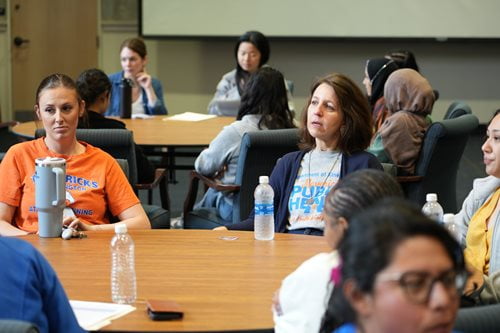Tuesday, Jun 24, 2025
• Thomas Johns :
By Thomas Johns
School of Social Work

Social Work as an educational field and career path offers students and professionals a variety of pathways to specialize within. However, while many pathways exist for future social work professionals, none exist in a vacuum.
At the University of Texas at Arlington School of Social Work, students regularly collaborate with peers in other degree paths to gain working knowledge of organizational structures, insights into other career paths and important knowledge of how to work with other professionals in any sector through interprofessional education activities, or “IPEs”.
“The definition of interprofessional education is when students from two or more disciplines learn from and with one another,” said Tracy Orwig, UTA School of Social Work director of interprofessional education and associate professor of practice. “IPE is this opportunity for us to educate other disciplines that we do so much more, and that social work is a broad career focus and the supports that we can provide on an individual level, families and communities.”
This exchange of knowledge and experience helps students develop a deeper understanding of the situations and organizations they may encounter in the professional world. By exposing students from various disciplines to the specialties of others, IPEs foster well-rounded professionals who are prepared to collaborate on tackling complex situations.
“In a hospital, I had to learn what all these disciplines were in the hospital. I didn't really understand the difference between an occupational therapist and a physical therapist,” Orwig said. “I had to learn while on the job. Because of IPEs, our students are now able to learn it before they go into their placements.”
While students gain valuable knowledge, they also build confidence to navigate challenges, as well as speak their minds and work productively with peers from different backgrounds.
“It's a safe space where if there is like an error or mistake made, this is the opportunity to learn from them,” Orwig said. “So, it's an opportunity to learn and understand that you're not ever going to know everything and that's why you have this team of varied professionals.”
Orwig explained that current IPEs focus on core competencies but will expand to offer more varied IPEs in the fall semester.
“We currently have IPEs that focus on competencies in values and ethics, communication teams and teamwork and then roles and responsibilities,” Orwig said. “We have an introduction to IPEs, child maltreatment, “A Day in the Life” which focuses on poverty, disability and ethics and healthcare and finally discharge planning. In the fall, we’re looking to pilot a disaster simulation.”
Orwig explained that IPEs are a crucial part of the course curriculum to make sure students receive the experience they’ll need in their future careers.
“IPEs are embedded in coursework; that way, we can guarantee our students are receiving well-rounded information and experience,” Orwig said. “In order for the event to count as an IPE, we’re required to have two or more disciplines, so we embed them in courses to make sure we’re getting various disciplines to interact.”
IPEs serve as an important initial step in teaching students from various degree paths how their specific disciplines work together to ensure patients and the people they serve receive the best quality care. By attending IPEs, students gain experience that will be important down the line.
“IPEs sound intimidating, but they can be a lot of fun, and they’re a great opportunity for our students to learn,” Orwig said. “I can’t think of one place where a social worker will work in a vacuum. Social workers work with so many people, from doctors to law enforcement, lawyers, and therapists. IPEs allow our students to work on these different teams and gain experience before they go into practice.”
